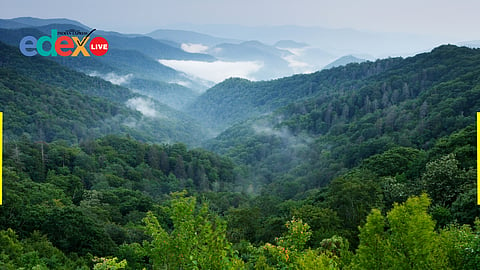
- News
- Campus
- Exam
- Podcast
- Web Stories
- Do You Know
- Path Finders - UG Programs
- Videos
- Book Review

We had a cloud burst last week in the Doon Valley. Thankfully the burst did not happen during a weekend, otherwise we could have had many a casualty from the National Capital Region (NCR). Come a weekend and you would find vehicles with registration numbers of the national capital, Gurgaon, Faridabad and more dominantly of Noida and Ghaziabad racing towards the twin settlement of Dehradun-Mussoorie.
Similarly on a Sunday evening or the last day of a holiday of an extended weekend, you would find these vehicles choking the Delhi-Meerut Expressway rushing back home. Though it may sound somewhat a long-stretched a theory, but the casualties which have been witnessed this Monsoon in Uttarakhand could well be blamed on the ill-conceived investment of funds from NCR in the Himalayan state.
The Himalayas are young mountains, geologically unstable and highly sensitive to human interference. Every widened road, every tunnel bored to save an hour off the drive destabilizes slopes that have not finished rising. Blasting rock to create “faster routes” invites landslides, disturbs aquifers, and channels floodwaters into once-stable valleys. When thousands of cars climb these roads each weekend, the ecological cost increases.
Many decades ago, George Harrison of the famous band Beatles had composed a song on Dehradun, whose lyrics went like, “Dehra, Dehra Dun, Many roads can take you there many different ways; One direction takes you years, another takes you days...” Today the roads to Dehradun doesn’t take days but is counted in the single digit hours.
The government is all set to reduce this distance further to less than three hours. When you have less hours to cover in the mountains, it means digging tunnels and pulling down peaks, which the recent disasters show that the nature has not taken kindly to.
Uttarakhand’s development today, largely in the sectors of real estate and hospitality, are being fuelled from the funds funneled from the national capital region. These funds are of two types, first from the new generation techies and corporates and the other being the traditional black dough.
The black funds spur construction of resorts and apartment blocks which have mushroomed in the river valleys and the new generation techies and the corporates come and occupy it on lavish rates. Investors, both tech-savvy professionals and those seeking to park black money, convert farmland into profit hubs.
The quotient of love for nature is minimal in this whole transaction. A known techie and corporate family recently went on a trip to Ram Nagar. This was intriguing as the gates of Corbett National Park are closed during the Monsoon months. They said they had hardly any interest in the tigers, the trip was an escape from the NCR and find a solace in the Himalayas albeit in a lavish resort.
Most of these resorts and hotels have come up in ‘syar’ of river valleys that is areas just beyond the riverbanks. These areas traditionally were used for farming and grazing lands. Today they are home to ‘tourist boom’ and death trap during calamities.
The so-called river-view paradises become deadly watery dungeons during cloudbursts, when rivers reclaim their beds with terrifying speed. A cloudburst is seldom known to hit settlements on the hilltop and cause the type of devastation it causes in the river valleys.
All these river view and hill view resorts and hotels are the biggest threat to the life and safety of the tourists from the NCR. The nature was kind that the latest cloudburst, as mentioned earlier, did not happen during the weekend, otherwise, god forbid many a families in the capital and its suburbs would have been counting casualties.
Stopping the ‘mad rush’ is not about gatekeeping the mountains, it is about survival both for locals and visitors. It’s important to have a cultural shift within the national capital region. Leisure need not mean a six-hour dash to a fragile ecosystem. Delhi’s citizens can nurture nearby green belts, or invest in sustainable retreats that do not require blasting mountains.
The cloudburst that mercifully missed a busy weekend should not pause us into smugness. Unless we curb our own appetite for quick escapes and easy profits, the next storm will not wait for our convenience, and the mountains may respond with irreversible fury.
(Article by Sidharth Mishra, author and president, Centre for Reforms, Development & Justice. Views expressed are their own)
